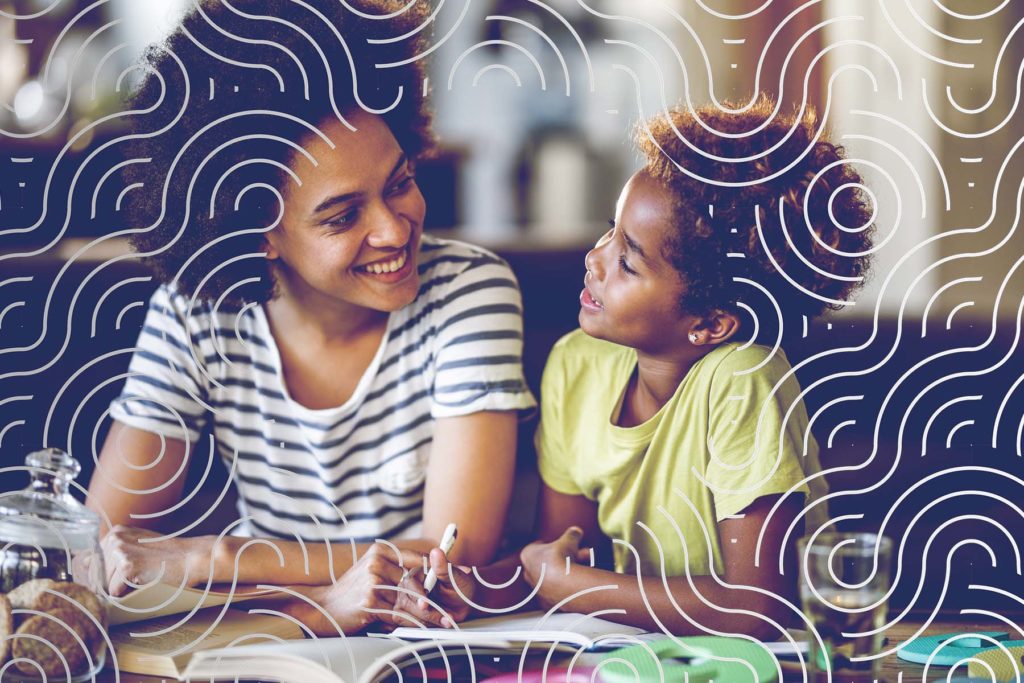
By: Jennifer McMillen Smith, MSSA, LISW-S, Division of Infectious Disease and medically reviewed by Ann Avery, Infectious Disease Physician at Metrohealth Medical Center
As parents, we’ve all been there, trying to figure out how to tell our kids about the big things in life. You know — the birds 🦅 and the bees 🐝 , the meaning of it all, and everything in between. Honestly, a lot of the same logic we use around those topics applies to how to talk about HIV, especially when (and even if) we should tell our children that we have HIV.
Let’s take a look at why this is so difficult and then explore a bit deeper so we can help you make the decision that is right for you. 💖
Why isn’t there a clear answer?
Well, every child is different, and so is every parent. Because of that, what works for one family might not work for another. There’s no universal blueprint, no surefire guide; we’re all just feeling our way through parenting. 👱🏾👶🏾 👧🏾👨🏿
Just like talking about sex in general, there’s a bit of discussion around the timing ⏱ and the appropriate amount of information when it comes to how to talk about HIV.
Some common questions you might have are:
- What’s the right age to tell my child?
- How should I bring up the subject?
- Will it affect our relationship?
- Should all my children be told simultaneously?
- Will it affect their social lives if others find out?
- Will they need support?
You might feel it’s better to tell them when they’re young, so it isn’t a shock later. On the other hand, since medicine is so advanced and you can live a healthy life, there may be no reason for them ever to know. Parents take supplements 💊 or other medication all the time, and it’s perfectly possible to go to checkups while your children are at school.
We’re here to tell you that both sides are right, and you only need to do what’s best for you and your little ones. Let’s go a little deeper. ⬇️
Why might you want to talk about your HIV status?
Many parents report feeling a heavy burden lifted after disclosing their HIV status. It’s not easy to keep secrets, especially from the ones we love, and HIV is a big one. ❤️
We’ve also heard a lot of cases where the child already knew something was wrong. Perhaps mommy or daddy needed to go to the hospital, but they couldn’t say why. That’s confusing and creates anxiety. You could connect quite a few dots by telling them and helping them come to the correct conclusions instead of them maybe making up a worse story in their heads. You might even bring your family closer together if all goes well. 🫂 It takes trust to talk about HIV, and who should we trust if not family?
Why might you not want to?
There are a couple of big reasons why you might not want to tell your child just yet. Ignorance is bliss, and sometimes we don’t need to have all the answers at once. For example:
- Keeping the secret 🤫: While you might be cool with your child knowing, children are famously terrible at keeping secrets. If your child talks about your HIV status at school, other kids (or adults) may treat them differently. Set your expectations for when and where it’s OK to talk about HIV accordingly.
- Your relationship might change: Although this is often only temporary, you could see a change in how your child acts around you. Some kids get clingy, others cry 😢, and others are hurt if they aren’t the first ones told, which can be especially challenging in a family with multiple children of varying ages.
- They might not be ready: Depending on their age, children can have a lot of stress in their lives. Adolescence, peer pressure, grades, and choosing to do the right things are all a big deal for kids. Is it the right time for them to hear about your HIV status, or should it be disclosed later? 🤔You know your child (or children) best!
Remember that even if you don’t want to tell your child everything, you can still tell them a little bit. Some parents choose to simply let their kids know there’s an infection in their blood and let their children accompany them to the clinic. Perhaps that’s all they need to know. It’s entirely up to you to decide how to talk about HIV.

The necessary preparation
Before we talk to our children, we should evaluate whether they’re ready for the information they’re about to hear. HIV disclosure is not something you can do in one go; it’s a complicated topic that you may want to discuss with your children gradually.
Your kids might feel a variety of fears, such as whether mom or dad might be in danger or whether they themselves might ‘catch’ it. They might worry that they are different from other people at school and feel isolated as a result. You should be prepared to alleviate these fears and walk them through how their lives will change, if at all.
Each child is different, and yours might express their emotions in varying or surprising ways, like sadness, anger, denial, or even complete indifference. Many parents give their children a bit of information and expect an onslaught of questions. While some children ask a lot, others only want to know if they have it, too. It’s okay if they don’t ask many questions, and you can still tell them more in their (and your) own time. 🥰
Our children also look to us to know how they should feel about something. If you are anxious, they might respond that way. Be calm, reassuring, and patient. Often children will react in the same way and feel better after.
Get tips here on what to say according to the age of your child and basic topics to cover.
How to talk about HIV: The way forward
If you do choose to tell your child, you might be worried about what to do next. Some children enjoy becoming part of your healthcare ❤️🩹 routine — it might help them to feel included and understand it. Others might benefit from having a family member, friend, partner, or another support person to talk to and help them make sense of everything.
You might also want to provide them with resources you trust to help alleviate questions, such as a few age-appropriate Positive Peers blogs. Often children are afraid to ask questions they think are stupid or potentially insulting, such as whether HIV can cause hair loss or can they use the same toilet as you. Providing resources for them to read through at their pace might be take some of the burden away from you.
Above all else, know that you’re not alone 🤗. Every parent goes through stressful experiences like this, with or without HIV.
Come join our private, stigma-free, supportive community.
Health management tools with medication & appointment reminders.
Social networking in a community with conversation & private chats.

